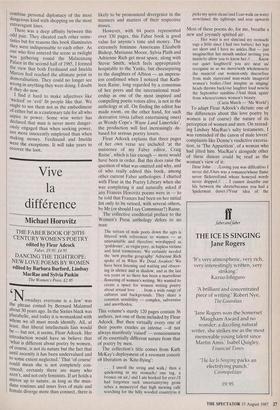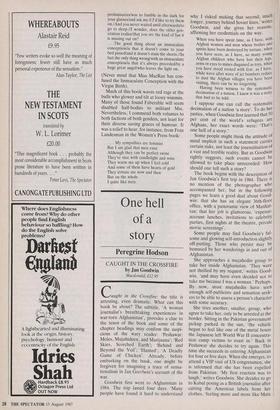Vive la difference
Michael Horovitz
THE FABER BOOK OF 20TH- CENTURY WOMEN'S POETRY edited by Fleur Adcock
Faber, f9.95, £4.95
DANCING THE TIGHTROPE: NEW LOVE POEMS BY WOMEN edited by Barbara Burford, Lindsay MacRae and Sylvia Paskin
The Women's Press, £2.95 owadays everyone is a Jew' was the phrase coined by Bernard Malamud about 30 years ago. In the Sixties black was plurabelle, and today it is womankind with whom we all must needs identify. All, at least, that liberal intellectuals fain would be — but not, it seems, Fleur Adcock. Her introduction would have us believe that `what is different about poetry by women, of course, is not its nature but the fact that until recently it has been undervalued and to some extent neglected.' That 'of course' Could mean she is not completely con- vinced; certainly there are many who aren't, and not only feminists. If art holds a mirror up to nature, as long as the mun- dane routines and inner lives of male and female diverge more than connect, there is
`N
likely to be pronounced divergence in the manners and matters of their respective muses.
However, with 64 poets represented over 330 pages, this Faber book is good value for anyone's time and money. The extremely feminine Americans Elizabeth Bishop, Marianne Moore, Sylvia Plath and Adrienne Rich get most space, along with Stevie Smith, which feels appropriately hospitable to the Yanks, but cheeseparing to the daughters of Albion — an impress- ion confirmed when I noticed that Kath- leen Raine, long regarded by a consensus of her peers and the international read- ership as one of the most inspired and compelling poetic voices alive, is not in the anthology at all. On finding the editor has made room, on the other hand, for such derivative trivia (albeit entertaining ones) as Wendy Cope's 'Waste Land Limericks', the production will feel increasingly de- based for serious poetry lovers.
Fleur Adcock explains that three pages of her own verse are included 'at the insistence of my Faber editor, Craig Raine', which is fair enough — more would have been in order. But this does raise the question of what was omitted and why, and of who really edited this book, among other current Faber anthologies. I chatted with Fleur in the Poetry Library when she was completing it and naturally asked if any Frances-Horovitz poems were in — to be told that Frances had been on her initial list only to be vetoed, with several others, by Mr (or should I say Commissar?) Raine.
The collective coeditorial preface to the Women's Press anthology defers to no man:
The terrain of male poets down the ages is littered with references to women — as unattainable and therefore worshipped as 'goddesses', as virgin prey, as hapless victims and fatal tormentors. We certainly needed the 'new psychic geography' Adrienne Rich spoke of in When We Dead Awaken! We have been listening and waiting and observ- ing in silence and in shadow, and in the last ten years or so there has been a marvellous flowering of women's writing. We wanted to create a space for women writing poetry about sexual love . . . from a wide range of cultures and backgrounds. They share a common sensibility — complex, subversive and unorthodox.
This volume's sturdy 120 pages contain 36 authors, not one of them included by Fleur Adcock. But then virtually every one of their poems exudes an intense —if not always manifestly 'raised' — consciousness of its essentially different nature from that of poetry by men.
The collection's title comes from Kath McKay's deployment of a resonant conceit of liberation as 'Kite-flying':
. . . I unroll the string and walk,/ then a quickening in my stomach) one tug, a bounce on air) and I am hooked for ever.//I had forgotten such uncertainty/my groin aches a memory/of that high mewing call/ searching for the hilly wooded country/as it
picks my spirit clean//and I can walk on water now/dance the tightrope and soar upwards
Most of these poems do, for me, breathe a new and joyously spirited air:
. . Her waist is not slim/and my stomach/ sags a little since I had two babies ).her legs are short and I have no ankles./But — just imagine/that her mouth smiles/ inviting you inside/to allow you to know her.// . . Know our quiet laughter/if you are near us/ recognise us as we move/with wholeness/to the music/of our women-only discos/free from male stares/and man-made images/of women's bodies.//Just imagine us singing/ heads thrown back/our laughter loud now/in the September sunshine.//And think again/ from whence/comes women's beauty.
(Caeia March — 'Ms World') To adapt Fleur Adcock's dictum: one of
the differences about this love poetry by women is (of course) the nature of its perception of women and men. On reread- ing Lindsay MacRae's salty testaments, I was reminded of the canon of male lovers' complaints like Donne's vindictive excoria- tion, in 'The Apparition', of a woman who had jilted him. MacRae's alongside other of these dances could be read as the woman's view of it:
Dear John . . ./Loving you was difficult/so I never did./Ours was a romance/whose flame never flickered/and whose honeyed words never dripped.//. . . I cannot describe our life between the sheets/because you had a Spiderman duvet.//Your idea of the preliminaries/was to fumble in the dark for your glasses/and ask me if I'd like to try them on./And you never waited until afterwards/to go to sleep.//I wonder, does the older gen- eration realise/that you are the kind of fun it is missing out on?
. . .The good thing about an immaculate conception/is that it doesn't come to your bed pissed/and it doesn't stain the sheets.//In fact the only thing wrong/with an immaculate conception/is that it's always preceded/by a huge great angel/who leaves the light on.
(Never mind that Miss MacRae has con- fused the Immaculate Conception with the Virgin Birth).
Much of this book waves red rags at the bulls who glower and tilt at loony wimmin. Many of those found Faberable will seem disabled half-bodies to militant Mss. Nevertheless, I commend both volumes to both factions of both genders, not least for their diverse saving graces of humour. It was a relief to hear, for instance, from Fran Landesman in the Women's Press book:
. . . My sympathies are feminist But I am glad that men exist Although they can be perfect swine They're nice with candlelight and wine They warm me up when I feel cold And some of them have hearts of gold They irritate me now and then But on the whole
I quite like men.



















































 Previous page
Previous page